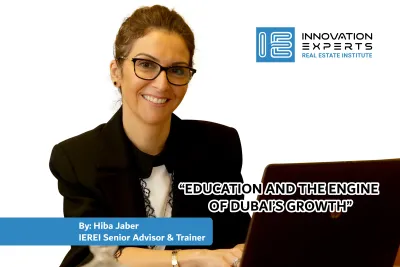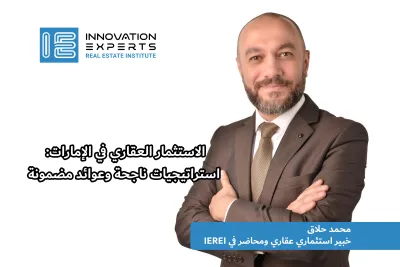The Secret of Selling More Real Estate
(IEREI Course by Georg Ortner)
Strategies for Selling More Real Estate in Dubai: Mastering the Market and Enhancing Client Trust
In Dubai's dynamic real estate landscape, selling properties successfully requires not only market expertise but also an in-depth understanding of client expectations and buying motivations. With property seekers ranging from investors to end-users, real estate agents need tailored strategies to build trust and close deals efficiently. This article will explore key strategies for selling real estate in Dubai, focusing on actionable techniques that guide clients through the buying process. Moreover, we’ll introduce our training course, "Selling more Real Estate" to equip agents with specialized skills for navigating Dubai's unique property market with specialized trainers like Georg Ortner who has been selling real estate for 30 years.
1. Building Client Relationships through Understanding and Empathy
Real estate agents in Dubai are often dealing with a diverse pool of potential clients from various backgrounds, each with unique expectations. Whether clients are looking for high-return investment opportunities or a dream home, a personalized approach to understanding their specific needs is essential. By learning to ask the right questions and listening actively, agents can uncover the motivations behind each purchase. For example, understanding whether clients value close proximity to business centers, serene community environments, or future resale potential can help you present the most relevant properties, thus positioning you as a trusted advisor rather than a
sales-focused intermediary.
Using a consultative approach, agents are encouraged to apply techniques from our course, “Offplan Sales - The Risks, Rules, and Due Diligence,” where they learn about the unique requirements of Dubai’s off-plan buyers. Off-plan buyers are typically interested in project completion dates, developer reputation, and the projected ROI, making it crucial for agents to provide well-rounded, accurate insights into the market and the risks involved.
2. Qualifying Clients Effectively to Build Trust and Save Time
One of the first steps to successful selling is effective client qualification. In Dubai’s competitive real estate environment, wasting time with unqualified leads can lead to
frustration and lost opportunities. Qualifying potential buyers at the outset not only ensures a smoother process but also allows agents to focus on high-potential clients who are ready and financially prepared to make a commitment.
Qualification involves understanding client expectations around budget, preferred locations, and timeline. During the first contact—whether by phone, in person, or via a virtual meeting—real estate agents should ask open-ended questions that gently probe client motivations. This stage is crucial in assessing the client’s readiness to buy and can help in aligning their expectations with realistic market conditions. Our "Selling more Real Estate" course equips agents with strategies for qualifying clients, highlighting the importance of due diligence and discussing specific inquiries to help agents identify genuine interest.
3. Presenting Properties Strategically: Selling a Lifestyle, Not Just a Space
Real estate in Dubai is not only about square footage but also about lifestyle. A key aspect of selling more real estate involves positioning properties as solutions to clients' lifestyle aspirations. By showcasing Dubai's unique blend of luxurious living, modern infrastructure, and investment potential, agents can connect properties to the client's broader life goals.
Property showings should be immersive, designed to help clients envision themselves in the space. For instance, agents might use questioning techniques to encourage potential buyers to imagine how they would use each room or enjoy the nearby amenities. Rather than merely listing features, effective agents can ask, "Can you see yourself enjoying your morning coffee with this view?" This method draws clients into the experience, letting them emotionally invest in the property.
With off-plan sales, where there may be no physical structure to view, agents need to rely on floor plans, digital mock-ups, and comprehensive brochures to help clients visualize. In our sales courses, agents learn the art of selling a future lifestyle, focusing on how to use available resources to create a compelling narrative about the property.
4. Mastering the Art of Questioning and Objection Handling
Questioning techniques are an essential tool for real estate agents aiming to sell more effectively in Dubai. By asking targeted, open-ended questions, agents encourage clients to express concerns and expectations, which provides insight into potential objections before they arise. Questions such as “What features are you prioritizing in your ideal
home?” or “What is the most important factor in your investment decision?” can reveal underlying concerns, helping agents address them proactively.
Objections, often a natural part of the buying process, offer agents an opportunity to provide reassurance and build client confidence. Common objections may range from financial concerns to doubts about neighborhood appeal or future development plans. Rather than dismissing objections, skilled agents can use them as springboards to clarify the property’s value, turning potential objections into selling points. For instance, if a client is concerned about a high-rise property’s location, an agent might highlight the panoramic views, explaining how the unique vantage point adds to the home’s exclusivity.
5. Objection Handling and Negotiation Techniques: Converting Doubts into Deals
Handling objections smoothly and professionally is integral to closing sales. In Dubai, where high-value property transactions are frequent, buyers often seek reassurance and clarity before making final decisions. Unresolved doubts can lead to deal hesitations, so agents should approach objections with empathy and tact. For example, if a buyer raises concerns about property prices, agents can respond by offering insights into Dubai’s robust property appreciation rates, drawing comparisons with similar listings to justify the value proposition.
Negotiation is another critical step in the sales journey, where both parties—buyer and seller—need to reach a mutually satisfying agreement. Agents must balance advocating for fair prices with recognizing when flexibility might be needed to secure a deal. Using techniques like the "summary method" or the "isolation technique," as discussed in our course, agents can steer negotiations by summarizing key property benefits or focusing on unique features. The goal is to reassure clients that they are making a
well-considered decision.
6. Showcasing Market Expertise through Transparent Due Diligence
Dubai’s real estate market attracts a wide range of buyers, including international investors, who may not be familiar with local laws and regulations. Demonstrating thorough market expertise is vital for building trust. Agents must be well-versed in Dubai’s real estate regulations, property taxes, and legal frameworks. By offering detailed due diligence and transparent information, agents reassure clients of their credibility, easing concerns and empowering clients to make informed choices.
Our training course, “Selling more Real Estate” provides agents with the knowledge needed to perform rigorous due diligence. From understanding developer credibility to reviewing contract terms, agents can learn how to guide clients through every stage of a sale, ensuring they are fully aware of the investment implications.
7. Building Long-Term Client Relationships through Excellent Post-Sale Service
In Dubai’s real estate industry, a strong reputation is invaluable. Offering exemplary post-sale service is one of the best ways to foster long-term client loyalty and encourage future referrals. Clients often need guidance even after closing, especially if they’re new to Dubai or investing in a property for the first time. By providing resources, answering follow-up questions, and helping with property management recommendations, agents can leave a lasting positive impression that leads to further business opportunities.
Real estate agents who prioritize post-sale support distinguish themselves as
client-centric professionals, further establishing their reputation in Dubai’s competitive market.
Conclusion
Selling real estate in Dubai requires a blend of strategic questioning, thorough market knowledge, and empathy for clients’ needs and concerns. By focusing on understanding client motivations, presenting properties as lifestyle opportunities, and providing transparent due diligence, agents can enhance their effectiveness and close more deals. Our specialized courses provide a comprehensive toolkit for agents seeking to master these essential skills, equipping them to navigate the complexities of Dubai’s market confidently.
Incorporating these strategies into daily practice can help agents position themselves as trusted advisors, guiding clients through one of the most significant purchases of their lives and creating lasting relationships that benefit both client and agent in the long run.







